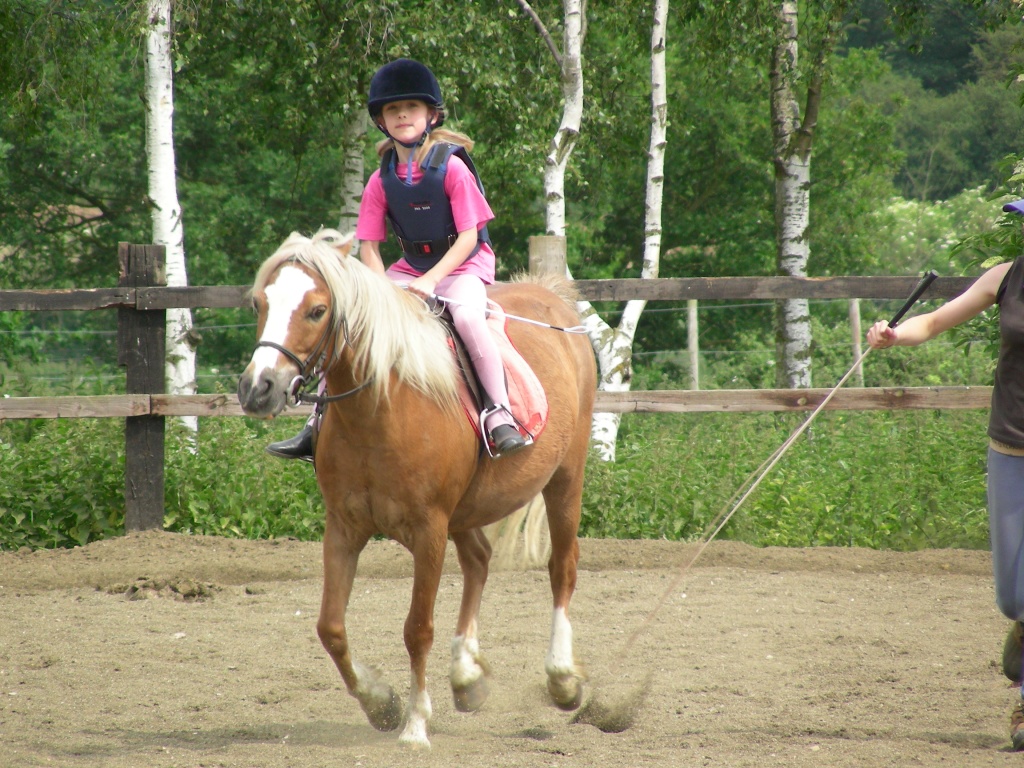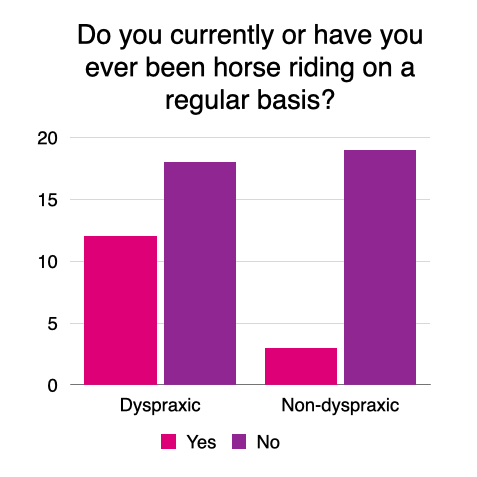I recently posted a poll on Instagram, asking both dyspraxic and non-dyspraxic people whether they currently or had previously been horse riding on a regular basis. The results were overall as I expected – a higher proportion of people who have dyspraxia had been horse riding than those without dyspraxia. You may wonder why that might be and why I thought to ask it in the first place. I’ll be talking about that more in this post!
When I was little, I loved horses. I had a horse themed bedroom and I even still have the rocking horse I got for Christmas when I was five years old!
At around the age of eight I started horse riding lessons, which I continued to do for a couple of years. Having talked to others with dyspraxia, I’ve noticed that lots of other dyspraxics seem to have been horse riding too, more so than those without dyspraxia.
So I decided to create a poll on Instagram. Not exactly a scientifically valid study, for various reasons, but it was aimed to give me a rough idea. There were two polls, each asking if the person used to go or currently goes horse riding on a regular basis – one poll was for those with dyspraxia to answer and another was for those without dyspraxia. Some people answered both, whilst some people who I know are dyspraxic answered the poll for people without dyspraxia – like I said, in no way was it a scientifically valid study!
Despite this, the results quite strongly supported my predictions. Of dyspraxic people, 40% (12 people) said yes, they had been horse riding regularly, whilst 60% (18 people) said no they hadn’t been horse riding regularly. In contrast, for people without dyspraxia, just 14% (3 people) said yes, they had been horse riding regularly, whilst 86% (19 people) said no they hadn’t been horse riding regularly.
So why might that be? I have a few thoughts. Firstly, those of us who have dyspraxia tend to struggle with team sports. They often involve fast movement, good coordination, spatial awareness, quick processing – essentially a lot of the things we find difficult! As a result of the difficulties we have with team sports, we might receive comments from others in school PE lessons and we’re often the ones people don’t want on their teams. But horse riding is an individual thing, all we need to do is focus on ourselves and the horse we’re riding. Connections with animals are also completely different to interactions with humans, which may be beneficial for those of us who find certain social situations difficult.
I also think that due to the fact that it can be harder to find physical activities we enjoy, dyspraxic adults/parents of dyspraxic children are more likely to be willing to pay for horse riding lessons, which can be expensive!
There are still some aspects dyspraxia will affect when we’re horse riding, balance being one of them. I know that from personal experience, having fallen off the horses around seven times over the two years I spent having lessons. Fortunately I didn’t injure myself – I started wearing a body protector after I’d fallen off the first couple of times. The first time I fell off was when the pony was walking, I’m not sure how I managed that one! Another time I fell off twice within an hour! That was when I was on a different horse though, I remember its name was Berry and it seemed very bouncy, which made balancing a lot more difficult. There was one particular pony I really liked riding, Minty, I’d always try to ride him if I could as the other ponies felt quite different. We sometimes had exercises to do whilst stationary on the horse, such as reaching forwards and backwards as far as we could, which I found quite tricky.
Although there were aspects I found difficult, I really enjoyed horse riding lessons and progressed from the beginner’s group with half an hour lessons to the next group up with one hour lessons. I once had an individual riding lesson and another time attended a day event at the stables. I was hoping to have had the opportunity to ride on the track/road but they asked some of us to stay and practice our ‘jumping’ (I say that in quotes because it was very small) instead, which was perhaps a polite way of saying they didn’t quite trust our ability to be on the track/road!

I also attended The Pony Club the stables ran, in some ways similar to Brownies where you earn badges but for things related to horses. For one of the badges we had to clean a saddle within a certain amount of time. I remember being worried about not being able to get it done in time due to my dyspraxia, so they offered to let me draw and label a bridle instead, which was slightly better but still wasn’t easy with dyspraxia!
Years later and my younger brother has since had horse riding lessons with his school at the same stables I went to, with his lessons led by volunteers from the RDA (Riding for the Disabled Association). Horse riding is an activity which can be enjoyed by so many people, regardless of their disability, which is one of the amazing things about it. I’d love to hear about your experiences in the comments below.
Natalie 🙂





